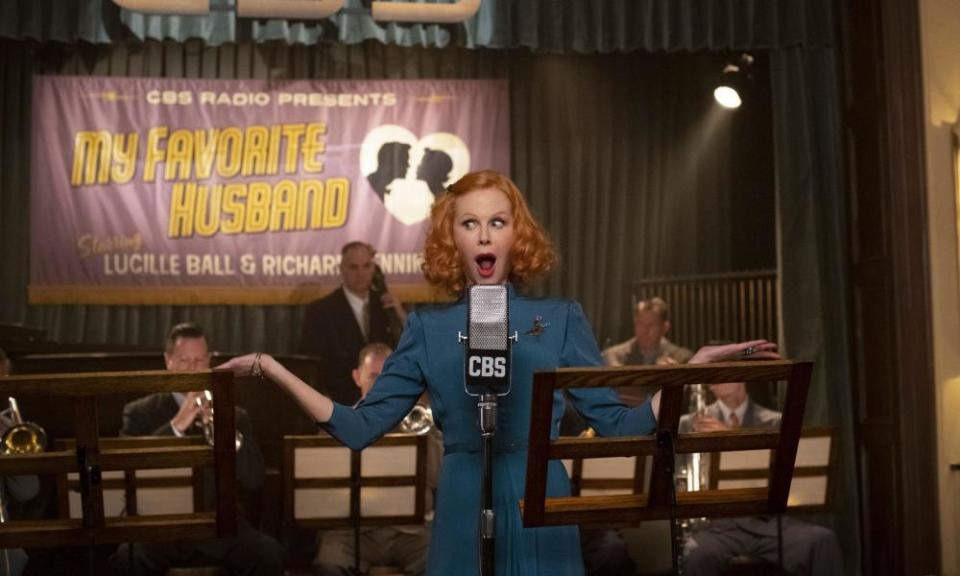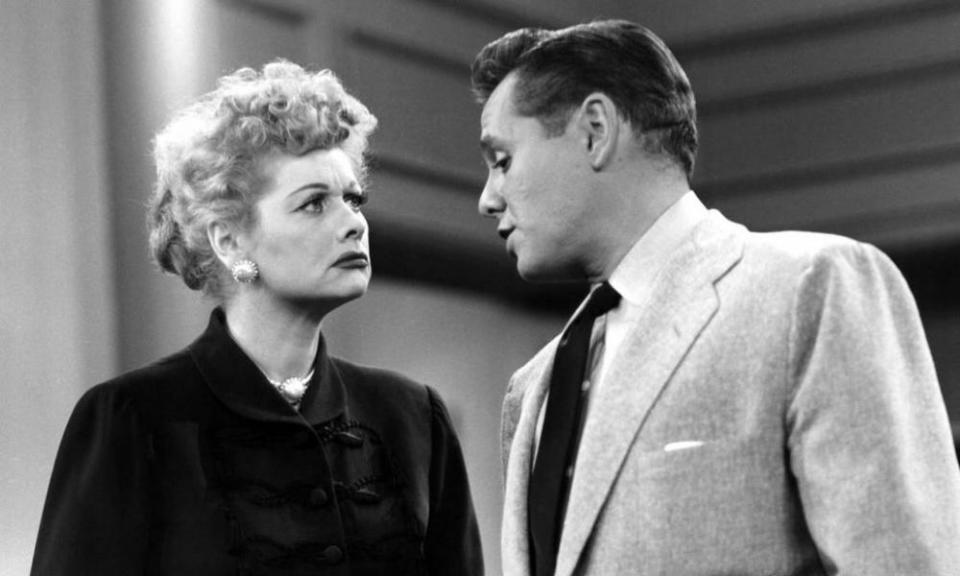‘She was very complicated. She was a conundrum’: who was the real Lucille Ball?
“She was very complicated, she was very loving and she was very mercurial. She was very generous but she came from the Depression and she was very guarded about money. She was a conundrum. She was a paradox of things. But she made me feel like I was the only person in the room, even in a crowd, and she made me feel authentic.”
Lee Tannen, author and playwright, is in full flow as he reminisces about his intense decade-long friendship with Lucille Ball, once the funniest and most famous woman in America. Her 1950s sitcom, I Love Lucy, pulled in 60m viewers and became part of the country’s cultural DNA.
Related: ‘She changed the way Americans thought about food’: the lasting legacy of Julia Child
Thirty-two years after her death, the legend is about to be burnished by Being the Ricardos, a biographical drama starring Nicole Kidman as Ball and Javier Bardem as Desi Arnaz, her husband both in real life and on screen. It explores the couple’s personal relationship – they divorced after 19 years but are said to have remained soulmates – and a professional crisis in which their careers were nearly derailed by the “red scare” in Hollywood.
This chapter of Ball’s career is so little known that writer and director Aaron Sorkin was unaware of it when he took on the project.
She was 24 when, in 1936, she registered to vote as a member of the Communist party to please her cherished grandfather (her father had died of typhoid fever when she was three). She thought little more of it, or about politics at all, but was hauled before the US House of Representatives’ Un-American Activities Committee in 1953.
When influential columnist and broadcaster Walter Winchell broke the news, and newspapers followed up, Ball seemed doomed to the fate as other Hollywood stars and screenwriters blacklisted by the communist witch hunt. She braced herself for booing from the studio audience at the next recording of I Love Lucy.
But before she walked on set, Arnaz warmed up the audience by quipping: “And now. I want you to meet my favourite wife – my favourite redhead – in fact, that’s the only thing red about her, and even that’s not legitimate.” (Ball had gone from brunette to blonde to red.)
Arnaz had saved the day. The crowd cheered. And the corporate powers behind I Love Lucy declined to kill the goose that laid the golden egg.
Speaking by phone from Stuyvesant, New York, Tannen says: “Lucy was the most apolitical person I know but it was a big deal and the only reason why her career was not ruined was because she was so beloved and Desi helped her through that point. There were people that committed suicide over this. This was a horrible, horrible, horrible time in America’s history.”
Ball had a previous career in Hollywood, making 75 films over 18 years at almost every major studio. She married Arnaz, a Cuban-born musician and actor who became a naturalised US citizen, in 1940. A decade later they went on a vaudeville tour, formed their own production company, Desilu (which produced Mission: Impossible and Star Trek), and conjured up the era-defining I Love Lucy.
Ball played Lucy Ricardo, a zany housewife with big dreams, while Arnaz (the first person to call her “Lucy” rather than “Lucille”) took the role of Ricky Ricardo, a Cuban-American bandleader. The show gained a huge national audience that would now be unthinkable in the fragmented era of streaming and continues to have a devoted worldwide following.
Tannen reflects: “It’s timeless. It’s endless. It skirts parody. It skirts politics, it skirts racism. It skirts everything. It’s just damn funny. The writers were in their 20s – they were kids – and they knew how to write and it was a new medium and we laugh at it today. Funny is funny. Lucy always said, you don’t cut funny, and she’s right. It’s just funny.”
Ball and Arnaz had two children, Lucie and Desi Jr, but could not hold the family together. They divorced in 1960 after she could no longer bear his alcoholism and extramarital affairs. Tannen continues: “To me, the more successful they became, the more unsuccessful they became, meaning professionally and personally.

“She told me that she never would have left him if they weren’t so famous and so in the public eye. The looks that she got from all the people in Hollywood and the women who were her friends who he fucked: she couldn’t take it anymore. It was really the womanising and the drinking and he couldn’t deal with the success.”
Ball took over as head of Desilu Productions, becoming the first woman to lead a major studio. She married stand-up comic Gary Morton in 1961 and remained his wife until her death from an aneurysm in 1989. But Tannen, a distant relation of Morton, is convinced that Arnaz was the great love of her life.
“Oh, not even close,” he says. “I say in my book that the day Desi died was the day she started dying. It was such a love affair that unquestionably she loved him until the day she died. And I believe he loved her.”
Tannen first met Ball briefly when he was very young, then again in 1980 when they hit it off and became inseparable. “It was this kind of kismet relationship. She became like a surrogate mother and I became like a surrogate son because you don’t have all that baggage – although we had baggage.
“I was probably with her more than her children in those years, 1980 to 1989. It’s a very bittersweet last decade, a few triumphs, a lot of disappointments and heartache. She died too young as far as I’m concerned and I still miss her every day.”
Tannen turned his decade with Ball into memoir, I Loved Lucy, which he adapted into a play of the same name and which, he hopes, might yet become a film. He indulged her love of backgammon, travelled with her and was in the audience when she received a Kennedy Center Honor in 1986 – five days after Arnaz’s death.
“That was my first decade of coming out as a gay man and she was coming into the last decade of her life, not that she knew it at the time,” he says tenderly. “I was unsure about my sexuality and she was unsure about a lot of things and so we sort of saved each other.
“I told her about being gay before I told my parents and I was so nervous about telling her and she was like, ‘What the hell? Why the hell didn’t you tell me in the first place that you’re gay?’ She was around gay men her whole life. So I loved how authentic she was with me and how authentic I was with her. That word keeps on cropping up.”

In a recent interview in the Hollywood Reporter, Sorkin was forced to defend his casting of Kidman and Bardem and raised eyebrows among Ball devotees by asserting: “It’s not a show that if we took a fresh look at today, we’d think was funny.” Being the Ricardos is likely to raise the question: has I Love Lucy stood the test of time?
Kathleen Brady, who interviewed Ball when she was 74 and wrote a biography, Lucille: The Life of Lucille Ball, says: “The show is still part of American culture. I meet some people who are sophisticated and they are doctors and they are lawyers and when they hear that I met Lucille Ball, they get so excited. I think the fact that show gives us so much joy means that yes, it is still relevant.”
Brady, whose latest book is Francis and Clare: The Struggles of the Saints of Assisi, adds: “She seems to be an oppressed housewife but this is about the struggle against power, which is a classic comic device, and it is about upending power, which, Lord knows, she was able to do.
“Before she would go on to ride the New York City subways and get a loving cup stuck on her head, she would vacuum the house, she would make sure little Ricky was taken care of – she was a really good housewife. I suppose if one wanted to be very serious, one could see Lucy Ricardo as a tragic figure but nobody wants to be serious when they are dealing with I Love Lucy because they’re just laughing too hard.”
A new generation of Ball fans includes Carrie Cooke Ketterman, a 35-year-old singer and author who lives in Corydon, Indiana, who started watching I Love Lucy at her grandmother’s house when she was five or six.
“I was being nosy one day and I was going through her VHS tapes and I was like, ‘What is this I Love Lucy?’ and I popped a tape in and I was hooked,” she recalls. “I thought she was so funny. I guess it was mostly her expressions that drew me in and these zany situations that she would get herself pulled into. I became a lifelong fan after that.”
Ketterman, a natural redhead, and her husband Jeff play Ball and Arnaz in a tribute show, touring festivals around the country. She adds: “Theirs was a very unique relationship. You can see in the photos and some of the home videos and what you’ve read about them, they genuinely loved each other.
“Of course it wasn’t perfect by any means. They both were so passionate and creative it’s normal for them to butt heads. They were under so much stress to keep Lucy going, especially once they saw what they had.
“But I think that love was real. It was always there, even if it wasn’t always the best at times. They were meant to be together and, as much as you want that happy Hollywood ending – they stayed together forever and ever, the end – real life doesn’t work like that sometimes.”
Being the Ricardos is in cinemas on 10 December and Amazon Prime on 21 December

 Yahoo Finance
Yahoo Finance 